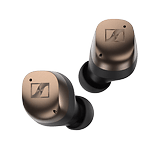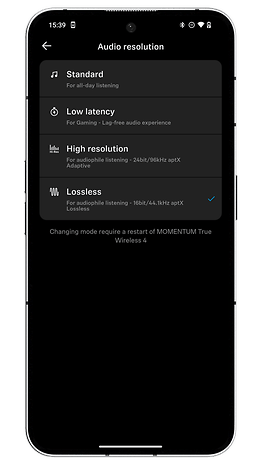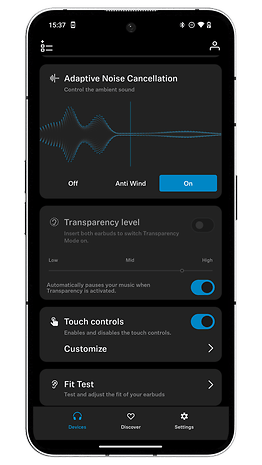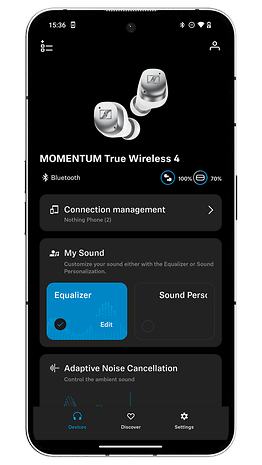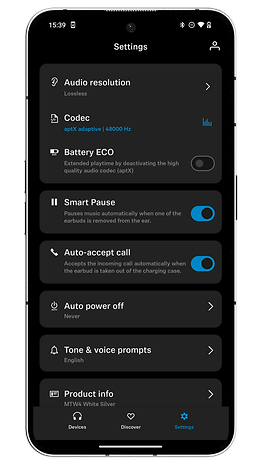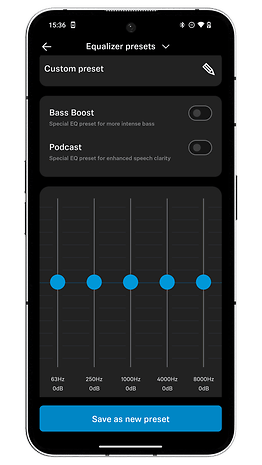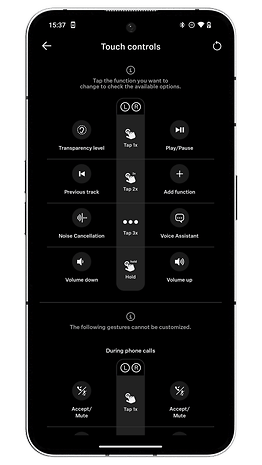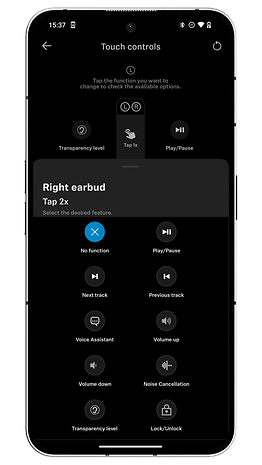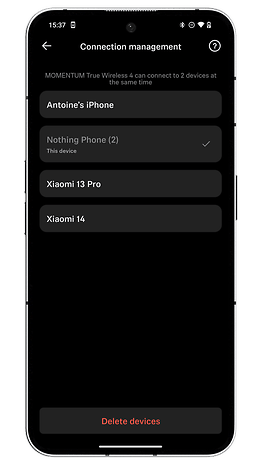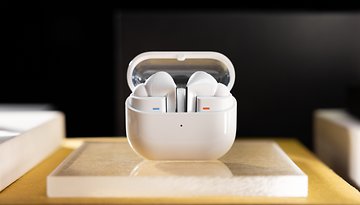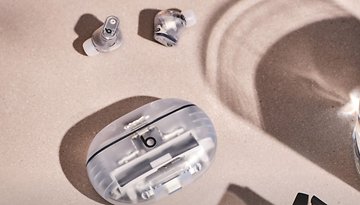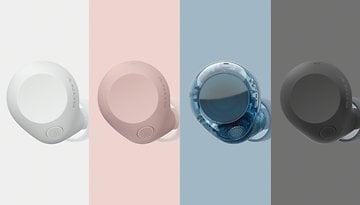Sennheiser Momentum TW 4 Review: Excellent Audio Quality Worth Its Price
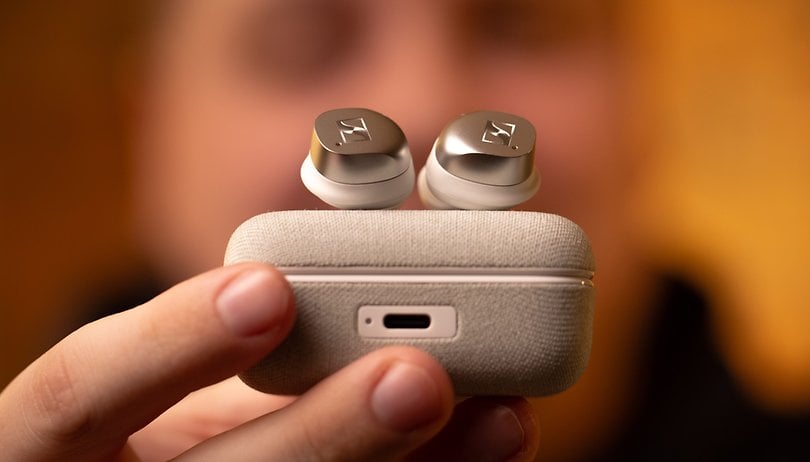

The Sennheiser Momentum True Wireless 4 are high-end wireless headphones with active noise reduction. Sennheiser focuses on audio quality, with HD codecs such as aptX lossless, long battery life of over seven hours, and Bluetooth LE Audio compatibility. In this full review, I give you my opinion on Sennheiser's new headphones and whether or not their 300-euro price tag is justified.
Good
- Excellent audio quality
- Bluetooth HD codecs (aptX HD/adaptive/lossless)
- Auracast and LE Audio ready
- Excellent battery life and fast recharging
- IP54 certified
Bad
- Noise reduction of any kind
- aptX lossless not yet widespread enough to be relevant
- Form factor can be uncomfortable
- High price
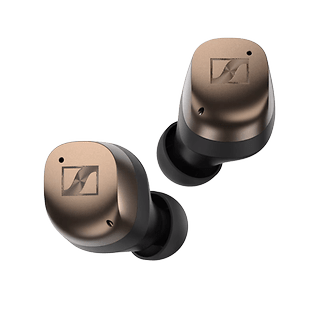
Reviews and buying guide
The Sennheiser Momentum True Wireless 4 have been available Q1 2024. The wireless earphones are priced at $300/300€. These are high-end wireless headphones, direct competitors of the Apple AirPods Pro 2 (review), Sony WF-1000XM5 (review), or Bose QuietComfort Ultra Earbuds recently tested.
Sennheiser wants its headphones to be "future-proof". The Sennheiser Momentum True Wireless 4 incorporates a host of technologies that are still emerging, to be ready once they are democratized. The aptX lossless codec for lossless audio, Bluetooth LE Audio, LC3, and Auracast. That's all very well, but for the time being, it's difficult to take advantage of these promising functions, as there aren't many smartphones compatible with them.
This makes it a little difficult to justify the 300 dollars/euros price tag. Nevertheless, the audio quality alone gives the Sennheiser Momentum True Wireless 4 a serious argument against its competitors.
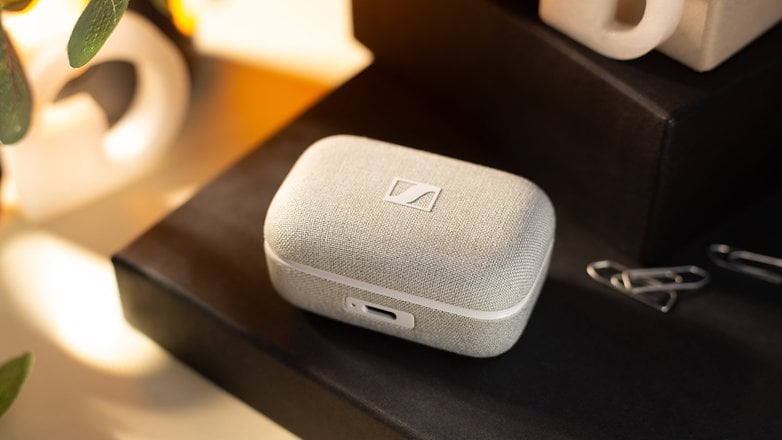
Design
The Sennheiser Momentum True Wireless 4 are in-ear format and have a rather bulky form factor. Their thick square shape is not very discreet in the ear. The casing is also rather massive, but with a nice mesh finish.
Pros:
- Attractive design, colors, and finish.
- IP54 certified.
- Good passive isolation.
Cons:
- No IP rating for the charging box.
- Massive form factor and a rather uncomfortable fit.
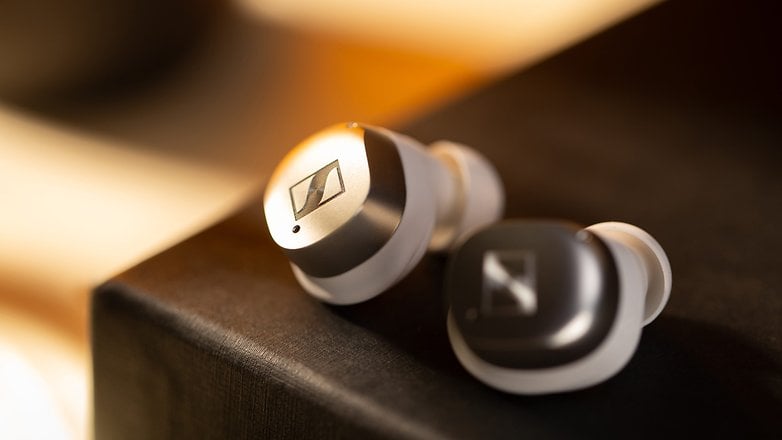
The wireless headphones come in three colors: copper black, metallic silver, and graphite. I got the metallic silver variant. As for the casing, it still has that famous fabric-effect coating that I find very classy, if a little messy.
The headphones are IP54-certified for water and dust resistance. Only the headphones, not the case. You can consider them for sports or wear them in the rain, but they won't withstand immersion.
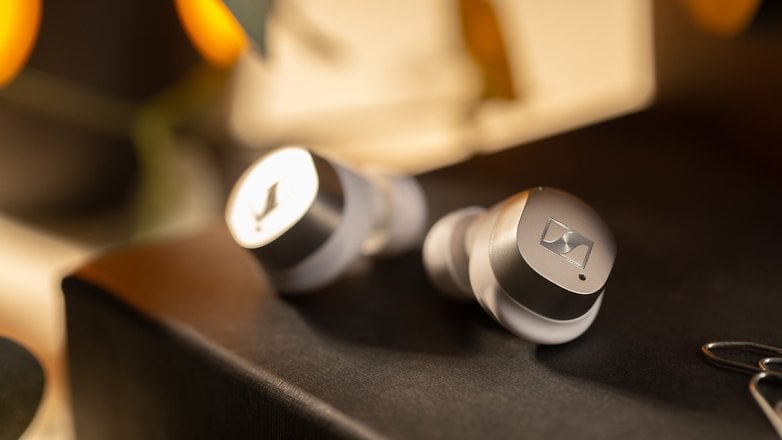
The Sennheiser Momentum True Wireless 4 look great. They have a premium design with a fine finish, that's undeniable. But they're not very comfortable to wear.
Their form factor is massive. Each earphone weighs 6.2 g. And their square shape is thick. Combined with the in-ear format, with eartips that fit into the ear canal, and I really had an unpleasant feeling of bulk in my ears.
Especially as the Sennheiser Momentum True Wireless 4 are equipped with touch-sensitive controls. Every time you press them, you push the headphones a little further into your ears. Sennheiser has even added small silicone fins to ensure a better fit and compensate for the "fat" appearance of these headphones.
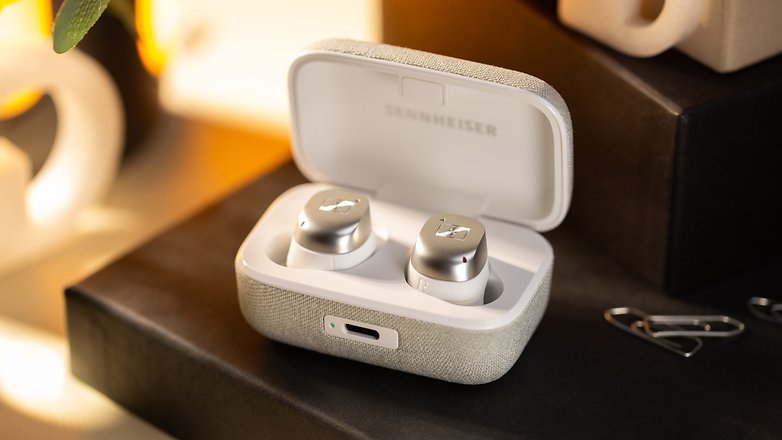
Audio quality
The Sennheiser Momentum True Wireless 4 are all about audio quality. Sennheiser promises lossless audio with the aptX lossless codec. The headphones have a very neutral audio signature. They rival Sony and do far better than Apple or Bose.
Pros:
- Very neutral audio signature.
- Plenty of detail.
- HD Bluetooth codecs.
Cons:
- Very few smartphones support aptX lossless.
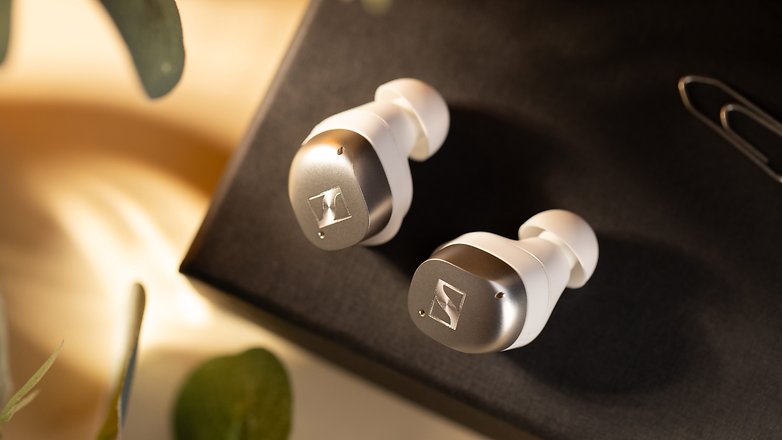
With 7 mm drivers and the latest Qualcomm S5 Gen 2 chip, the Sennheiser Momentum True Wireless combo offers a very neutral audio signature. These headphones are made for the bats among you who want to hear EVERYTHING.
Basically, there's no imbalance. Bass, midrange, and treble are all brought to the fore. I had the impression of having a very detailed sound that let me distinguish all the subtleties of the instruments and voices. In fact, the headphones can go quite low in the bass, with a frequency range from 4 to 21,000 Hz (on average, the headphones go from 20 to 20,000 Hz).
In my opinion, if you value audio quality, the Sennheiser Momentum True Wireless 4 are a better choice than Apple's AirPods Pro 2 or the Bose QC Ultra Earbuds.
How does CD lossless quality work?
Sennheiser wireless headphones support Bluetooth SBC/AAC codecs and all versions of aptX: aptX, aptX HD, adaptive aptX, and aptX lossless. According to the manufacturer, the latter makes it possible to listen to songs in CD quality.
What is CD quality? When it comes to sound quality, there are three elements to consider: bit depth, sample rate, and bitrate.
Sample rate: Originally, music was analog (vinyl records, etc.). To digitize it, you first have to sample the analog signal, i.e. take values from the signal at a certain interval. For CDs, this interval is 44.1 kHz. Every second, the sound is sampled 44,100 times. The higher the sampling rate, the more faithful the sound.
Bit depth: To quantify these samples in a way that a computer can interpret them, we use bits. For audio quality, the most common bit depth is 16 bits for each of the 44,100 samples.
Bit rate: This is the number of bits used to represent each second of sound. In CD quality, the bit rate is 1411 kbps or 1.411 Mbps. This value is obtained by multiplying the sample rate by the bit rate, but since there are two stereo channels, it must also be multiplied by 2: (16 x 44.100) x 2 = 1411200 bps, or 1411 kpbs or 1.411 Mbps. The higher the bit rate, the better the sound quality (and the heavier the audio file).
The aim of lossless CD quality is to enable headphones to reproduce this 16-bit/44.1 kHz stream at a bit rate equivalent to 1.411 Mbps.
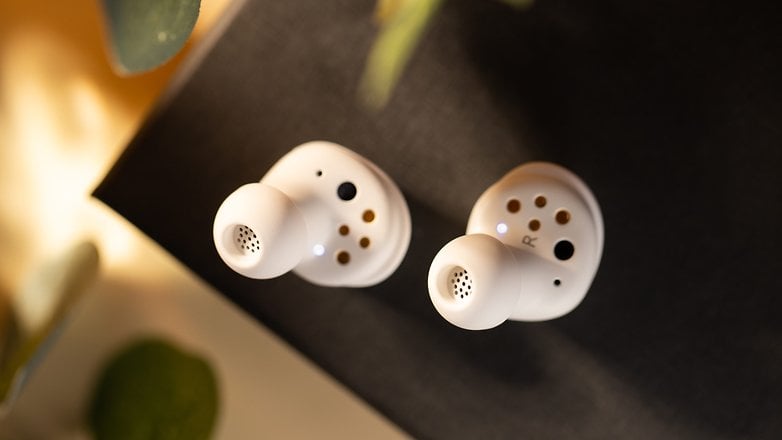
What role does the Bluetooth codec play here?
Sound quality is one thing. But just because your headphones can handle CD-quality sound doesn't mean they can deliver it without loss of quality.
With Bluetooth, this is virtually impossible. CD-quality sound is far too heavy for stable wireless transmission. That's why most Bluetooth codecs are destructive, producing lossy sound: even Sony's LDAC and Apple's ALAC, today's best references, are limited to around 990 kbps.
With aptX lossless, the promise is to offer a bit rate between 1100 and 1200 kbps. Basically, this codec enables you to transmit a CD-quality track (16 bit/44.1 kHz) with very little loss of quality, i.e. almost lossless, between your smartphone and your headphones. But...
Problem: Your smartphone does not yet support the aptX lossless codec.
AptX lossless was announced by Qualcomm in 2021. In theory, all Android smartphones with the minimum Snapdragon 8 Gen 1 SoC can support this codec.
But many manufacturers have yet to catch up. Samsung and Xiaomi don't offer aptX lossless, even on the Galaxy S24 and Xiaomi 14 models. The iPhone doesn't support aptX at all, since Apple has its own codecs, AAC and ALAC.
For the moment, only the recent Sony Xperia and the latest Asus smartphones, such as the Zenfone 10 reviewed in 2023 and the ROG Phone 8 have aptX lossless, to name the best-known brands.
I wasn't able to get my hands on these models for my test of the Sennheiser Momentum True Wireless 4. I was therefore only able to use the aptX adaptive codec.
This codec can handle files higher than CD quality (up to 24 bit/96 kHz) but with a bit rate of 420 kbps. So there's quite a bit of loss, and we're talking about "lossy" sound.
I'll update this test once I've had a chance to test aptX lossless. And I will shorten this section which is very long (sorry) to eventually make a separate article. I'm learning as you learn, so I hope my explanations are clear and accurate enough.
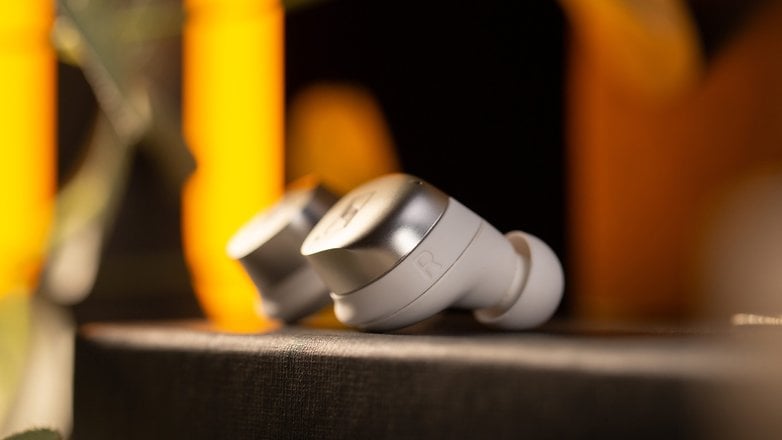
Active Noise Reduction (ANC)
The Sennheiser Momentum True Wireless 4 incorporate 3 microphones in each earphone to manage active noise reduction (ANC). In my opinion, they fall short of the best references on the market. The transparency mode also lacks a little naturalness.
Pros:
- Constant and solid-borne noise properly attenuated.
Cons:
- Not at the level of ANC from Bose, Apple, or Sony.
- Transparency mode lacks naturalness.
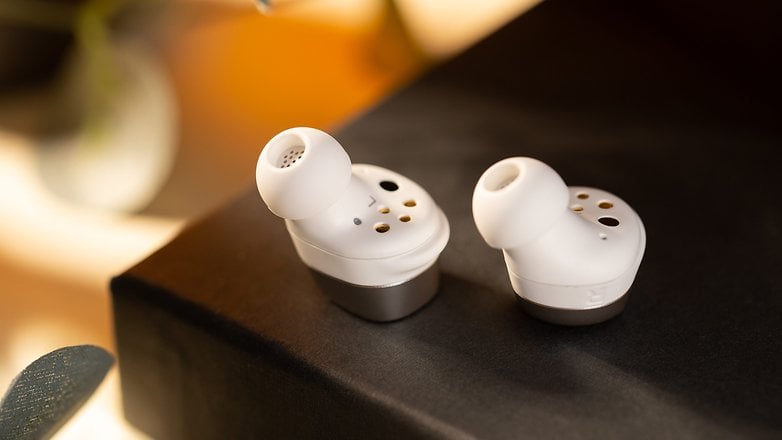
After testing the Bose QC Ultra Earbuds, I found the active noise reduction of the Sennheiser Momentum True Wireless 4 a little lacking. The basic passive isolation is good, thanks to the design of the earbuds. The ANC attenuates constant solid-borne noise correctly. However, this falls well short of the performance of industry leaders such as Bose, Sony, and Apple.
Sennheiser's active noise reduction is automatic; you can't adjust it manually. You can activate an "anti-wind" mode in the application, but I didn't notice much difference. The good news is that you can also deactivate active noise reduction to limit the software processing of your music. This is not possible with Bose, for example.
Transparency mode, which amplifies ambient noise, lacks naturalness. I found there to be distortion on human voices and a slight, rather annoying hiss effect. You can, however, adjust the intensity with a slider in the application.
Features and applications
The Sennheiser Momentum True Wireless can be operated with the Smart Control companion app. It's available on both Android and iOS and is fairly comprehensive, with a good equalizer. I found the multipoint Bluetooth very temperamental, however.
Pros:
- Precise 5-band equalizer.
- Port detection with automatic pause and off mode.
- Responsive, customizable touch controls.
- Bluetooth 5.4 (multipoint).
Cons:
- Capricious multipoint.
- No 360° audio (not really a flaw in my opinion).
- No location function if headphones are lost.
The Smart Control application is very good in terms of interface and settings. There's a very precise five-band equalizer, and you can customize the audio signature to suit your preferences with the Sound Personalization function.
You can also create "sound zones" to automatically change the behavior of the headphones according to the environment you're in. But you need to create an account to use it.
Port detection allows you to pause your music when you remove an earpiece, or pick up a call when you take an earpiece out of the charging case. There's also an automatic off mode so you don't drain the battery if you forget to put them back in the box.
Finally, the touch-sensitive controls are quite customizable. The Sennheiser Momentum True Wireless 4 recognize four touch gestures: single/double/triple/extended press, which you can assign to several actions.
Sennheiser's wireless headphones offer multipoint Bluetooth. But I found it rather temperamental when I connected the headphones to my PC and smartphone at the same time. Switching from one device to the other wasn't automatic, and I often had to switch manually via the app. Sennheiser has always had problems with this, and it's annoying.
Finally, no, the Sennheiser Momentum True Wireless 4 do not offer 360° audio. Personally, I prefer audio quality. But I can understand why some of you might consider this a flaw.
Autonomy and recharging
The Sennheiser Momentum True Wireless 4 also stand out for their excellent battery life. The headphones last 7.5 hours without active noise reduction and 7 hours with it. The recharge box allows at least two recharges and supports wireless charging.
Pros:
- Excellent battery life.
- Charging box supports wireless charging.
- Quick recharging of headphones via the box.
Cons:
- -
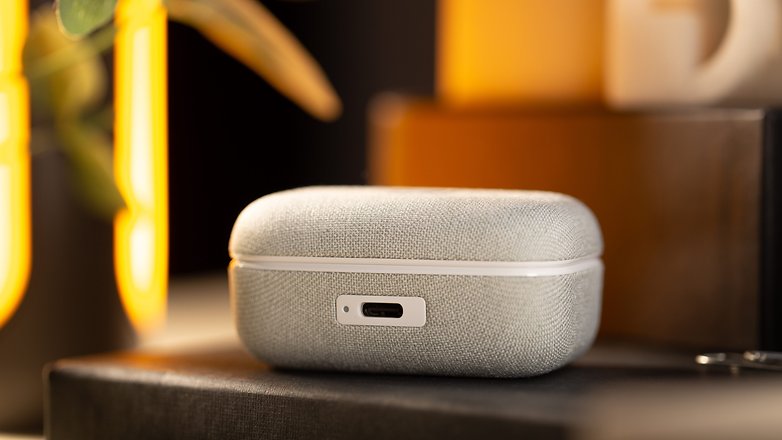
The battery life of Sennheiser's wireless headphones is well above average. I was able to use them for a full working day in the office.
Recharging via the case is pretty quick, too. It takes 1.5 hours for a full charge, whereas many competing models require two hours or more.
The box itself can be recharged via USB-C or wirelessly. In short, the Sennheiser Momentum True Wireless 4 are very durable headphones.
Technical data
| Technical data | |
|---|---|
| Product |
Sennheiser Momentum True Wireless 4
|
| Image | 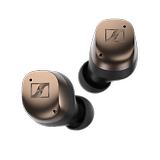 |
| Design |
|
|
|
|
|
| Audio |
|
| Frequency response |
|
| ANC |
|
| Bluetooth |
|
|
|
|
|
| Battery life |
|
|
|
| Price |
|
Conclusion
Would I advise you to buy the Sennheiser Momentum True Wireless 4 at $300? Yes, if you value audio quality and battery life, these are the best consumer headphones on the market, in my opinion.
I could have given them a 4.5. But I was a little disappointed by the temperamental multipoint Bluetooth and the not-quite-comfortable form factor.
Anyway, these headphones have better battery life than AirPods Pro 2, better sound than AirPods Pro 2 and on these points, they rival the Sony-WF1000XM5 which are my favorite headphones.
I can't wait for features like Auracast, aptX lossless codecs, or LC3 to become more relevant once smartphone manufacturers get up to speed.
What do you think of the Sennheiser Momentum True Wireless 4 after this test? Does the 300-euro price tag seem justified? And what do you think of the lack of 360° audio? Would you be interested in an update with my opinion on audio quality via the aptX lossless codec?
